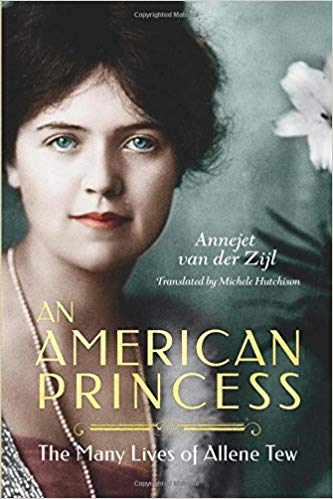An American Princess
by Annejet van der Zijl

An American Princess: The Many Lives of Allene Tew
by Annejet van der Zijl; Translated by Michele Hutchinson
234 pp.; AmazonCrossing, 2018
$31.98
Celebrities have always figured prominently in American culture. Hard as it may be to imagine now, they predate Hollywood. In the late nineteenth century’s Gilded Age, very wealthy people almost automatically became celebrities, especially if their stories began in obscurity. To journey from rags to riches, after all, was to live the American dream.
But, the same process that turned an ordinary person into a famous one–ironically–buried his or her real personality in a glossy coating of cliché. What held true for men like John D. Rockefeller, was also applicable to women like Allene Tew. People thought they knew them, and passed judgment accordingly. But who were they, really? Only a combination of time, and sensitive biographers could begin to restore their true personalities.
Dutch author Annejet van der Zijl’s lyrical biography, “American Princess: The Many Lives of Allene Tew”, tells an authentically human tale. Now largely forgotten, Tew was one of the best-known and most remarkable women of her age. Born in 1872 to undistinguished middle-class parents, she grew up in the small resort town of Jamestown, New York, along the shores of Lake Chatauqua. Though intelligent and beautiful, Allene had no reason to expect anything more than a humdrum existence and marriage—perhaps—to a hotel owner or bank manager.
However, Jamestown was a popular vacation spot for the very rich–and one of them, Tod Hostetter–fell in love with her. No one would have paid much attention if he had just seduced and abandoned her, but to everyone’s shock, he eloped with a woman far beneath his social class. In an instant, she took a share in one of the grandest fortunes in America, founded on sales of the medically dubious, but vastly popular Dr. J. Hostetter’s Stomach Bitters. And, in the same moment, which would last her entire life, Allene Tew became a celebrity.
The road forward would be more exciting—and more painful—than she could have ever imagined. Over the following decades, Tew became a fixture in popular newspapers and magazines. Readers marveled at her riches, expressed in lavishly decorated homes, magnificent gowns, fine horses, and—eventually–marvelous automobiles. At the same time, they gasped and sneered at what they thought they knew of her personal life; for Hostetter, who died at age thirty-two, would only be the first of her five husbands.
Beneath it all, though, Tew remained the same woman. Strong-minded and focused, she also possessed a deep sense of personal empathy that overflowed the rigidly Victorian code of personal conduct she imposed upon herself. The primary tragedy of Allene Tew’s life was her almost compulsive longing to love and care for others. Unfortunately, many recipients of that love—like Hostetter, a gambling addict and wastrel—did not deserve it. Others, like her two children– died early; one was killed in World War l; the other perished from influenza.
Allene Tew’s inner strength emerges from van der Zijl’s compassionate narrative even if all of the outlines of her personality do not. But that is not the biographer’s fault. Like others who lived their lives in the public eye, “Princess Allene” guarded her “inner being”, closely.
Whatever others said or did, her life was always her own. Perhaps the book’s most moving passages show Tew boldly choosing the natural surroundings around which she chose to finish her life. This beautifully written—and translated—biography brings Allene Tew’s inspiring humanity into focus.
Ed Lengel is an author, a speaker, and a storyteller.




